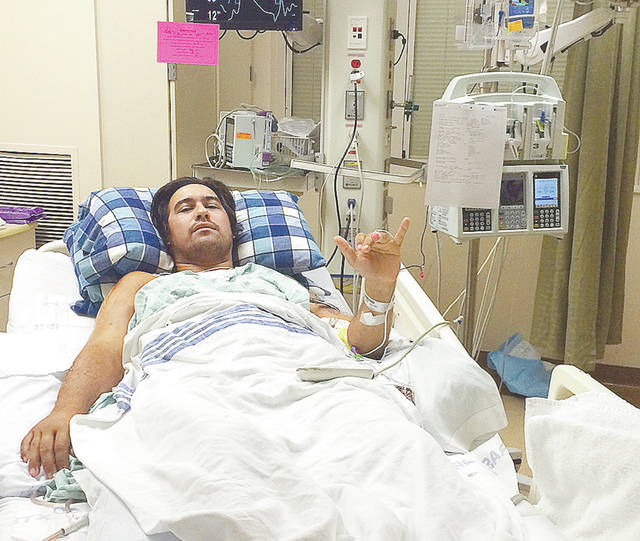KAILUA-KONA — Sharks circled as Kawika Akana Matsu lay on a paddleboard — injured and drifting out to sea in the south Atlantic Ocean.
The Volcano man had just fought off what he believed were two great white sharks, each taking their own bites of flesh from his right arm and left leg.
“When it first happened I was like, ‘you mother (expletive),’” Matsu said as he thought back on the first attack. “Then it came to, ‘Do I want to live?’ And ‘Yeah, I do want to live.’”
The 37-year-old is recovering at Broward Health Medical Center in Fort Lauderdale, Florida, from the incident, which occurred on July 24 while he was paddleboarding in English Bay at Ascension Island. Matsu had been working on the island as an HVAC contractor for the U.S. Department of Defense.
He’d been living on the island, located between South America and Africa, for little more than a year and was preparing to come home for leave.
On the day of the attack, Matsu said he met up with friends to hang out and barbecue on the beach.
“It was hot and the water was all turquoise,” he recalled. “I said, ‘I think I’m gonna jump in the water to cool off.’”
Matsu was almost 300 feet from the shore on a paddleboard when a large great white whacked his board.
“Next thing I knew I was four to six feet in the air,” Matsu said. “As soon as I hit the water, it latched on into my right shoulder, looking right at me.”
The shark then took him down three to five feet in the water and started to shake him.
Matsu said he didn’t fight and he didn’t pull away. He didn’t want to make the injury worse.
But Matsu did punch the shark twice in the nose with his left arm. The shark released him after the second punch and Matsu swam ferociously to the surface.
“I started paddling for the board when I got bit on my left thigh, butt cheek area,” he said.
To escape its jaws, Matsu said, he did a downward swat. While he didn’t have a good angle, the shark released him, which allowed him to get back to his board.
“After the attack, it was almost like they let me get on the board,” he recalled.
As he was lying on the board, Matsu saw something floating nearby.
“I saw a big chunk of meat floating in the water — I picked it up and put it on the board with me,” he said.
The chunk of meat turned out to be his triceps.
Matsu said blood was streaming from his arm, so he used the paddleboard leash as a tourniquet.
“You go into this survival mode,” Matsu said. “Either you have it or you don’t. It’s just one of those things.”
After he was back on the board, Matsu screamed to his friends for help. No one had seen the attack. Eventually, he was able to get their attention and they called for help.
Matsu drifted for 28 minutes as the sharks circled before an emergency boat with Ascension Island Mountain and Sea Rescue located him and brought him to safety.
“It felt like forever, but when I finally got rescued I started to relax. They told me not to relax because they still needed to get me to town to the hospital,” Matsu said.
Matsu was at the island hospital for three days before he was airlifted to the Florida hospital, just under 5,000 miles away.
“I would’ve never lived if it weren’t for the people on Ascension Island,” he said. “Everyone came out to donate blood. They kept me alive — them, the nurses, the British doctors.”
Unfortunately, doctors were unable to save Matsu’s triceps. Fortunately, the sharks missed all of Matsu’s major organs and arteries, only taking muscle and skin, he said.
Doctors weren’t able to start putting him back together until recently because they found two different strains of bacteria inside the wounds — which Matsu points to as evidence that he was attacked by two different sharks.
He was put on antibiotics for five days prior to surgery on his arm, which occurred on Aug. 8.
“It was a waiting game, letting the three antibiotics do their work,” Matsu said.
Matsu has also been getting skin and muscle grafts.
Doctors completed a fifth surgery on Thursday. All the wounds are now in the process of being closed up with the help of a vacuum pack. The machine, Matsu said, has a tube that is placed inside the wound, then sucks out fluids while it pulls skin and muscle together to seal it.
Matsu was moved out of the Intensive Care Unit Saturday. A sixth surgery is scheduled to take place Tuesday.
Matsu said doctors have been optimistic about his recovery.
“If the next surgery goes well, I could be out by next weekend,” Matsu said.
All he wants to do is come home so he can start his recovery, but that is contingent on whether he can physically make the flight.
If that’s not possible, Matsu said, he will go to the West Coast — California or possibly Oregon — to start his recovery. Matsu said the success of his rehabilitation is based on how his body reacts to the skin grafts.
Despite the attack and the difficult road ahead, Matsu is optimistic and said he can’t wait to get back in the water again. The waterman knows he’s sharing the ocean with predators.
“There’s been a lot of sharks there,” Matsu said. “But are you not going to do what you love to do?”
Matsu’s family has put together a Go Fund Me account to help with his medical expenses: www. gofundme.com/kawikarecovery





